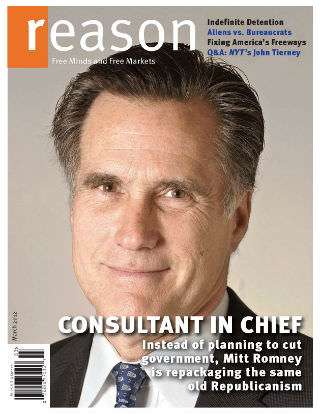Why Would Anyone Want Mitt Romney to Run for President in 2016?

Today in oh-fer-cryin-out-loud: In an article titled "Romney 2016 is for real," The Washington Examiner's Byron York looks at the movement to keep Mitt Romney—yes, that Mitt Romney, the oddly robotic candidate who looks like Mr. Fantastic, the wealthy former consultant who casually makes $10,000 bets with his opponents, the policy-specifics averse former Massachusetts governor who inspired so little enthusiasm as he topped the GOP ticket and lost by three four points in 2012—in the mix as a potential contender for the Republican Party's presidential nomination in 2016.
Why, you might wonder, would anyone want Romney to run again? He offered almost nothing to the ticket in 2012 except a bland respectability. Against the weak GOP lineup he was facing, that was enough to win the nomination. But most Republican voters never really loved the guy, and he never really seemed particularly fond of Republican voters or conservative policies (remember, this is the guy who as Massachusetts governor signed into law the model for Obamacare, hoping that the rest of the nation would follow).
His domestic policy agenda, in particular, was intentionally kept vague and largely substance free; he wasn't running on what he would do so much as what he wouldn't be—Obama. There was almost no positive case to vote for Romney, and he and his team barely attempted to present one. Another nod for Romney would only serve to further cement the already pervasive notion that the Republican party is an agenda-free-zone when it comes to policy.
Romney was nominated because he seemed more electable than the rest of the field. Relatively speaking, that impression may have been right, but it's hard to run on electability after having soundly lost a major national election.
So what's the case for another Romney campaign? York's piece implies that part of it is the sense that he could represent the interests of some of the party's moneyed establishment, large segments of which supported him in 2012. The establishment is looking for a contender, and they think Romney could be their best bet, especially if former Florida governor Jeb Bush decides not to run. Romney seems to think of his own campaign as a kind of alternate to a Jeb Bush candidacy. But once again, the reasoning relies on dubious assumptions about electability. According to York, "Romney is said to believe that, other than himself, Bush is the only one of the current Republican field who could beat Hillary Clinton in a general election." How's that for unshakable confidence?
There's still no agenda, just a sense of unease amongst an influential part of the Republican donor class that Romney could be the best hope they have. That a Romney run is being discussed as a live possibility suggests that some of the party's old guard is worried about losing that influence.
They're not the only ones with an interest in a Romney run, however. York quotes a GOP operative who suggests another reason why some in the party want to keep the Romney 2016 dream alive: money. Romney spent a lot of it in 2012, and there are plenty of people in the GOP campaign business who stand to make quite a bit from another run. "All his people want him to run again because they made so much money off it the last time," the operative, who didn't work on Romney's last campaign, tells York.
In other words, the case for Romney in 2016 is rather like the case for Romney in 2012: Romney, who was in the GOP primary fray in 2008 as well, would still like to be president, there are some party bigwigs who see him as their best shot, and some campaign professionals would like to cash in on yet another sure-to-be-pricey run. That's not an argument for why Romney should run. It's an argument for why he shouldn't.


Show Comments (40)